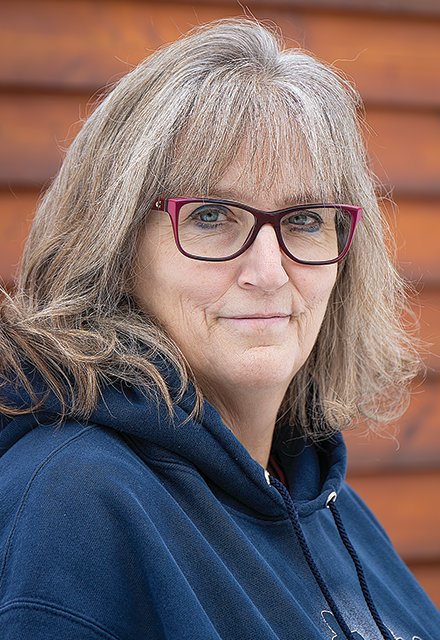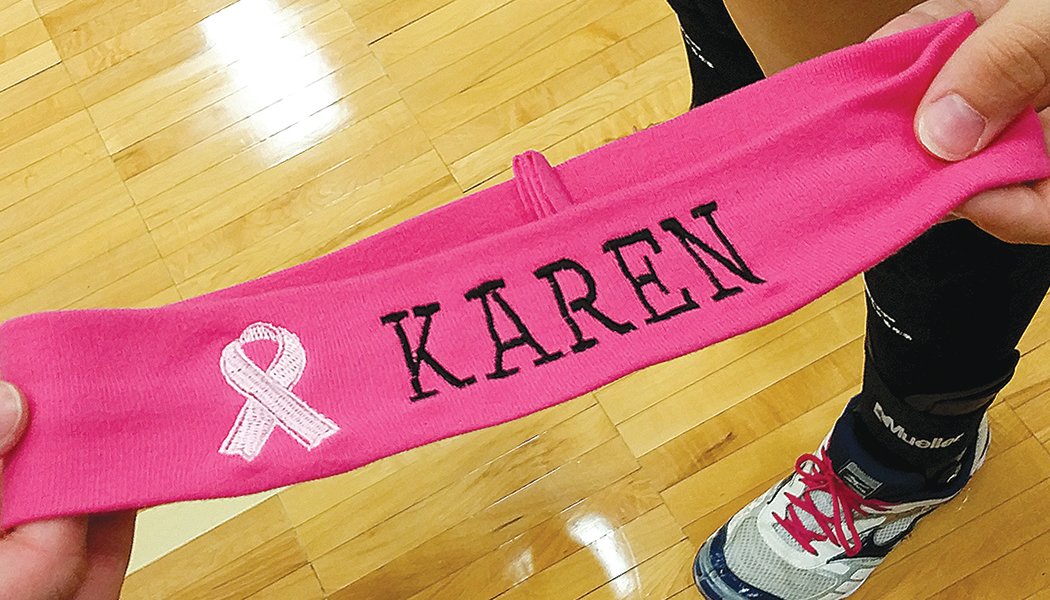Support the Timberjay by making a donation.
Life’s too short
A wife and mother battles breast cancer
COOK- It was supposed to be just another ordinary day at the end of August in 2014 when Karen Schultz, of Cook, hopped in her car and drove to Hibbing. She was on her way to an appointment, and …
This item is available in full to subscribers.
Attention subscribers
To continue reading, you will need to either log in to your subscriber account, or purchase a new subscription.
If you are a current print subscriber, you can set up a free website account and connect your subscription to it by clicking here.
If you are a digital subscriber with an active, online-only subscription then you already have an account here. Just reset your password if you've not yet logged in to your account on this new site.
Otherwise, click here to view your options for subscribing.
Please log in to continue |
Life’s too short
A wife and mother battles breast cancer
COOK- It was supposed to be just another ordinary day at the end of August in 2014 when Karen Schultz, of Cook, hopped in her car and drove to Hibbing. She was on her way to an appointment, and she’d done this before.
“It was just a ‘go in for your annual female thing every year,’” she said. “I’d never had any issues. Everything always came back good.”
It took just one look at the mammography screening technician’s face for Karen to know this time was different.
“I remember it like yesterday,” Karen said. “I said to her, ‘You see something.’ She said, ‘You know, I can’t tell you, Karen.’”
Another tech came in, and they rescanned Karen’s left breast. The next question caught her off guard.
“So, it comes back and they said, ‘Did you drive here by yourself?’” she said. “And I said, ‘Yeah, I always do you know?’”
“Well, we’re going to do a biopsy.”
Karen called her husband, Scott.
“He said, ‘Oh, my God,’” Karen said. She told him not to drive down, there was nothing he could do. They did the biopsy and she drove home.
“We were both scared,” she said. “It was a long couple of days because you know they saw something.”
It was Labor Day weekend, and when Karen was back at work at Disability Specialists that next Tuesday she received the news she didn’t want to hear – she had breast cancer. She wanted to stay at work, but a colleague convinced her to go home. It was about 12:30 p.m.
“What are you doing home?” Scott asked when she arrived.
“I just started crying, and I said ‘I have breast cancer,’” Karen said.
While she sat on the couch and cried, Scott reacted just the way she knew he would, a few minutes of shouting and swearing, and then gathering himself together, he said, “Okay, what are we gonna do? We got this.”
The next step was to call their daughter Angela and son Matthew, who were 17 and 15 at the time, and tell them to come home alone. When they arrived, Karen told them the bad news.
“They both started crying. My son got up, went in his room and slammed the door,” Karen said. “My daughter got up, went in her room and slammed her door. I remember Matthew saying ‘You’re going to die.’”
Karen went to talk to both individually, giving them both the same message – we’ll get through this and “I will kick cancer’s ass.”
But the conversations weren’t easy.
“To tell Scott was hard, but to tell our kids, that killed me. It absolutely killed me,” Karen said.
Treatment
What Karen experienced next was something common among many breast cancer patients.
“Then came the part where everybody wants to tell you what to do with your body,” she said.
Her doctor in Hibbing wanted Karen to have a lumpectomy; Karen had something else in mind. She researched options extensively and talked with Scott.
“What he had in mind and what I had in mind were two different things,” Karen said.
When Karen went back to Hibbing and told her doctor she wanted to have a double mastectomy, she told Karen that she was overreacting. Karen disagreed and said she wanted to get a second opinion.
“I remember leaving there as mad as can be,” she said.
Karen went to St. Mary’s Medical Center in Duluth, and her experience with Dr. Audrey Park-Skinner was far different. Park-Skinner walked her through all of the possible treatment options.
“I still have her drawings,” Karen said. “She said, ‘This is your decision. This is your body.”
Karen talked things over with Scott, and when they went back to see Park-Skinner, all three were in agreement on a double mastectomy.
Karen’s surgery was on Nov. 4, and Scott was there for the 16-hour ordeal. Karen had elected to have a TRAM flap procedure in which a plastic surgeon makes a bikini-line incision to take abdominal skin, fat, and muscle to use for reconstruction after the mastectomy is performed.
When Karen came out of recovery, she told Scott to go home.
“I told him not to come back because it was almost deer hunting opener,” she said.
She spent the next five days in the hospital largely alone, although her daughter and her boyfriend skipped school one day to come see her, and a family friend who was on the Hibbing Fire Department, Brian Warner, stopped in when he was at the hospital on an ambulance run. Karen said she was constantly getting phone calls and texts from Scott and the kids.
“I could’ve come home the 8th, but it was the opening of deer season,” Karen said. “So, I came home the 9th. They always went hunting with dad opening weekend, and I didn’t want to disturb that. I wanted to try to keep things as normal as we could.”
Homecoming
The Schultz family hadn’t lived in Cook very long but had a connection there because Scott had graduated from Cook High School. Once Karen was back home, the family got the full experience of the helping nature of Cook.
“It was like the whole community,” Karen said. “People were dropping off food, from sports parents to neighbors to people that just knew us. These were people that I didn’t really know. To have people stop over, to send cards in the mail saying they’re thinking about you, that means a lot to people who are going through stuff.”
Karen came home with drain tubes and bulbs hanging on her chest and abdomen to collect the fluids from her surgical wounds as they healed. Scott cleverly figured out that they could loop a hockey shoelace around her neck and could pin the bulbs to it so they wouldn’t get dislodged when Karen took a shower. She was sore, tired, and the abdominal incision didn’t heal as fast as she expected. She had to depend on Scott and Angela to provide taxi service for her for weeks until she could drive on her own again. She had applied for a position with the Cook Ambulance crew but withdrew it because she didn’t have the strength for lifting.
But Karen was determined not to miss any of her children’s sporting events, even if she couldn’t stay for an entire football game or volleyball match.
And, in turn, the North Woods athletes demonstrated their respect and support of her.
Karen was startled when, at a volleyball match in Babbitt, the loudspeaker blared an announcement about her, and Angela and her teammates marched onto the court wearing pink headbands with her name and a white ribbon on them.
“I lost it,” Karen said.
And at a home football game, Karen watched from the top of the bleachers as the team marched from the school to the field.
“As they rounded the corner, I could see they were all in pink,” Karen said. “Gary and Ginger Abramson from KGM Construction bought the whole football team pink socks. Then they all stopped, and Travis Hooper said, ‘Hey, Mama K, this one’s for you.”
Karen found yet another source of support when she returned to work at Disability Specialists. She said her boss, Jim Nyhus, had a brother who had died from breast cancer, and he did everything he could to accommodate her needs.
“He was very understanding,” she said.
Karen didn’t have a physical therapy regimen for rehabilitation, but she and Scott “did a lot of walking,” sometimes three times a day, to rebuild her stamina and strength.
Karen eventually achieved her goal of working for the Cook Ambulance, but attaining her goal led to another serious health issue this past March. Coming home from a run on a snowy night, Karen watched in horror as her partner drove through a stop sign at a T intersection south of Hibbing and slammed into the opposite ditch. The impact bent the ambulance frame, but even worse, it broke Karen’s back. It took more than four months for her to recuperate, but she’s once again up and making runs.
Challenges
The type of breast cancer she had was “estrogen-driven,” Karen said, which means that she could have a reoccurrence of cancer in other areas estrogen affects. She was on a regimen of anti-cancer pills and follow-up visits for several years, but she didn’t take the last year’s worth of pills and hasn’t been back to see her oncologist in quite a while.
The reason? The Schultzes can’t afford health insurance.
They had good coverage when Scott worked at Minntac, but he was forced to retire several years ago with a medical condition, just six months shy of qualifying for coverage available to long-term employees. Between his pension and Karen’s earnings from ambulance work, the couple makes too much money to qualify for public assistance but the cost of premiums on the state’s health care exchange is too high, Karen said.
“I can’t afford it,” she said. “So that fear of cancer coming back? That’s pretty real.”
Reflections
Karen said she was raised to be independent and strong, but as she looks back on her experience, that’s one thing she would change a little bit.
“I do want people to know it’s okay to be afraid,” she said. “It’s okay to say you need help. I never did. I wanted to be strong for my kids and for Scott because I knew if something were to happen to me, they’d be devastated. But, you know, I wish I would have asked for more help. I do.”
But she’s thankful for the way her husband and children have stood with her through it all, and for the perspective her battle against cancer has given her.
“It changes you, it truly changes you,” Karen said. “It makes you look at things. You don’t take things for granted. Life’s too short to have any regrets. Life’s too short to hold grudges.”
Karen said that every woman should get regularly-scheduled mammograms, even if they don’t have insurance and think that they can’t afford it. She said Scenic Rivers Clinic in Cook participates in a state program that pays for screening and diagnostic services for breast cancer. The Scenic Rivers Clinic in Tower and Essentia Health Clinic in Ely are also listed as participants in the SAGE program. A description of the SAGE program, a full list of providers and eligibility criteria are available online at https://www.health.state.mn.us/diseases/cancer/sage/index.html.
And while many breast cancer survivors channel their experiences into outspoken advocacy efforts, Karen said she doesn’t see herself doing that. As a more private person, she prefers to find opportunities to provide one-on-one support, like she’s been doing recently for an ex-sister-in-law who has been diagnosed with breast cancer. She said she welcomes anyone who needs a listening ear to look her up.
“If you’re going through it and you need somebody to talk to, get ahold of me,” she said.









